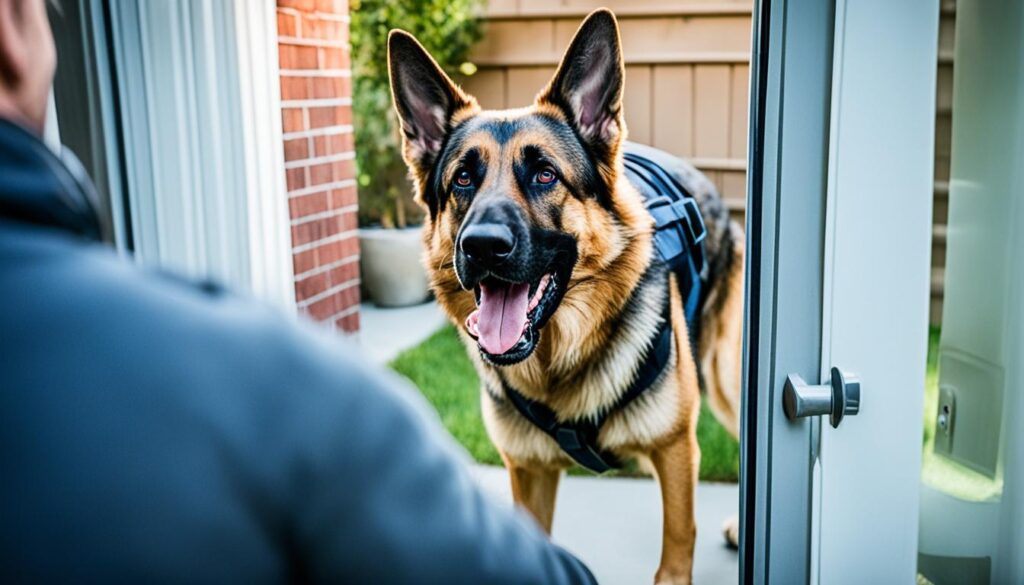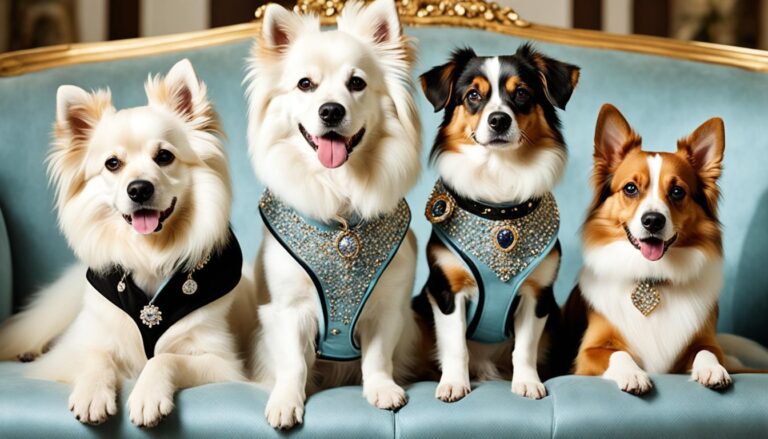Are German Shepherds Mean? Unpacking the Myth
Did you know that German Shepherds are often unfairly labeled as a mean or aggressive breed? Contrary to popular belief, aggression in German Shepherds is not an inherent trait of the breed. It is a result of improper training, socialization, or environmental factors.
German Shepherds are highly intelligent and trainable dogs known for their loyalty, protectiveness, and versatility. With the right care and training, they can be excellent family pets. However, it is essential to understand their temperament and address any potential aggression in a responsible manner.
Understanding German Shepherd Behavior Problems
Like any other breed, German Shepherds may exhibit behavioral problems if not properly trained and socialized. Some common behavior problems in German Shepherds include aggression towards other dogs or strangers, separation anxiety, excessive barking, and destructive chewing.
Signs of aggression in German Shepherds can include growling, lunging, snapping, or biting. It is important for owners to address these issues early on and seek professional help if needed. Proper training, obedience classes, consistent discipline, and positive reinforcement methods can help modify and manage these behavior problems in German Shepherds.
“Understanding and addressing behavior problems in German Shepherds is crucial for a harmonious and happy relationship between you and your dog.”
To gain a deeper understanding of the behavior problems in German Shepherds, let’s take a look at some of the most common issues:
| Behavior Problem | Description |
|---|---|
| Aggression towards other dogs or strangers | German Shepherds may display aggression out of fear, territorial instincts, or inadequate socialization. |
| Separation anxiety | German Shepherds can become anxious and exhibit destructive behaviors when left alone for extended periods. |
| Excessive barking | German Shepherds have a strong protective instinct, which can manifest as excessive barking in response to perceived threats. |
| Destructive chewing | German Shepherds, especially puppies, may engage in destructive chewing to relieve boredom or teething discomfort. |
Addressing these behavior problems requires a combination of proper training techniques and a deeper understanding of your German Shepherd’s needs.

By identifying the root causes of these behaviors and implementing positive reinforcement training methods, you can help your German Shepherd become a well-behaved and balanced companion.
Preventing and Managing Aggression in German Shepherds
Preventing and managing aggression in German Shepherds is crucial for their well-being and the safety of those around them. Early socialization and positive reinforcement training play a key role in shaping their behavior and reducing the likelihood of aggressive tendencies.
One effective method to prevent aggression is to expose German Shepherds to different people, animals, and environments from a young age. This helps them become well-adjusted and less likely to exhibit aggressive behaviors. Gradual exposure and positive experiences can help build their confidence and reduce fear-based aggression.
Training should focus on teaching German Shepherds basic obedience commands, such as sit, stay, and come. Building a strong foundation of obedience helps establish boundaries and reinforces your role as the leader. It is also important to teach them proper leash walking techniques and impulse control to prevent reactive behaviors.
Remember: Avoid using harsh punishment or dominance-based training methods with German Shepherds. These techniques can incite fear or aggression and may worsen their behavioral issues. Instead, opt for positive reinforcement training, rewarding good behavior with treats, praise, or play to reinforce positive associations.
If you’re struggling to manage aggression in your German Shepherd, it’s advisable to seek professional help from a certified dog trainer or behaviorist. These experts can provide personalized guidance based on your dog’s specific needs and temperament.
By taking proactive steps in preventing and managing aggression, you can create a harmonious and safe environment for your German Shepherd and ensure their overall well-being.
Expert Tip:
“Consistency is key when training German Shepherds. Establish clear rules and expectations, and stick to them. This helps them understand what is expected of them and reduces confusion, which can contribute to aggression.”
Conclusion
German Shepherds are not naturally mean or aggressive dogs. Like any breed, their temperament is influenced by genetics, upbringing, and training. With proper care and attention, German Shepherds can become loyal, affectionate, and well-behaved companions.
Responsible ownership is crucial in preventing aggression in German Shepherds. Early socialization plays a significant role in shaping their behavior. Exposing them to various situations, people, and animals from a young age helps them develop into well-adjusted and confident dogs.
In addition to socialization, positive reinforcement training methods are essential. By rewarding good behavior, using treats, praise, and toys, we can encourage German Shepherds to make positive associations and understand what is expected of them. Harsh punishment and dominance-based training techniques can backfire and intensify aggression.
Providing mental and physical stimulation is also crucial for their overall well-being. German Shepherds are intelligent dogs and thrive when given opportunities to exercise their minds and bodies. Engaging them in activities such as puzzle toys, obedience training, and regular exercise helps prevent boredom and channel their energy positively.
If you are considering getting a German Shepherd or already have one, it is essential to educate yourself about their specific needs and commit to being a responsible and knowledgeable owner. By understanding their temperament, preventing aggression, and investing time in training and socialization, you can enjoy a fulfilling relationship with your German Shepherd for years to come.
FAQ
Are German Shepherds naturally mean or aggressive?
No, aggression in German Shepherds is not a trait inherent to the breed. It is often a result of improper training, socialization, or environmental factors.
What are some common behavior problems in German Shepherds?
Common behavior problems in German Shepherds can include aggression towards other dogs or strangers, separation anxiety, excessive barking, and destructive chewing.
What are the signs of aggression in German Shepherds?
Signs of aggression in German Shepherds can include growling, lunging, snapping, or biting.
How can I prevent aggression in my German Shepherd?
Preventing aggression in German Shepherds starts with early socialization and positive reinforcement training. Exposing them to different people, animals, and environments at a young age can help them become well-adjusted and less likely to show aggression.
How can I manage aggression in my German Shepherd?
Managing aggression in German Shepherds involves proper training, obedience classes, consistent discipline, and positive reinforcement methods. Consulting with a professional dog trainer or behaviorist can provide additional guidance and support.
Are German Shepherds good family pets?
German Shepherds can make excellent family pets with the right care and training. They are known for their loyalty, protectiveness, and versatility.
What should I do if my German Shepherd exhibits behavior problems?
If your German Shepherd exhibits behavior problems, it is important to address these issues early on and seek professional help if needed. Proper training, obedience classes, and consistent discipline can help modify and manage these behavior problems.
How can I ensure the overall well-being of my German Shepherd?
Responsible ownership, early socialization, positive reinforcement training methods, and providing mental and physical stimulation are key to ensuring the overall well-being of German Shepherds. Educate yourself about their specific needs and commit to being a responsible and knowledgeable owner.








